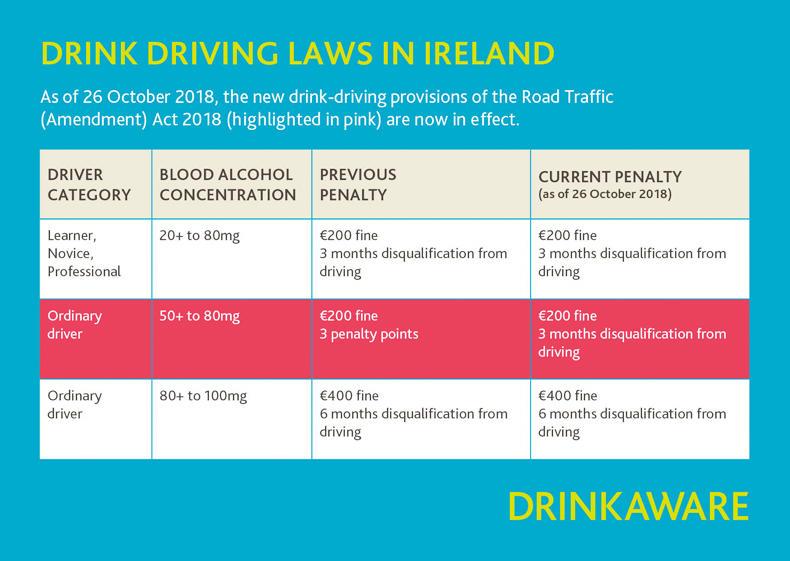With large gatherings are banned due to Covid-19, St Patrick’s Day has all but been cancelled.
Pubs are now closed and most people are practising social distancing, resulting instead in quiet drinks at home or even virtual online parties with friends.
There is certainly a different feel to St Patrick’s Day this year, but looking at Drinkaware’s most recent research, it appears that more than just the coronavirus that has had an effect on our national relationship with alcohol.
National survey
The results of Drinkaware’s 2019 national survey sees 64% of adults saying that there should be an official breathalyser recommended for personal use.
This shows that more adults are taking their alcohol consumption seriously, though Drinkaware discourages the use of breathalysers to gauge levels of inebriation.
While they can be useful for information purposes, the results should not be taken as a clear indication that you are under the limit
“Consumers need to be mindful that most off-the-shelf breathalysers are not developed using the same medical and safety technology standards as those used by officials like the gardaí,” says CEO Sheena Horgan.

Drinkaware CEO Sheena Horgan.
“While they can be useful for information purposes, the results should not be taken as a clear indication that you are under the limit.”
Shift in attitudes
The breathalyser question represents a larger shift in the attitudes of rural dwellers toward drinking and driving.
The survey’s results also indicate that 22% of rural-based drinkers have switched to non-alcoholic beers and other beverages if they plan to drive that evening or the following morning.
In addition, 50% make plans for alternative transport if they’re planning on drinking, while 36% cut down on drinking if planning on driving the following morning.
It shows the power of legislation of influencing behaviour in a positive way
Sheena maintains that the Irish approach to alcohol still needs to change, though she is also heartened by these numbers, which show that last year’s legislative changes in drink driving consequences have been effective.
“It shows the power of legislation of influencing behaviour in a positive way,” she says.
“There was lots of debate, media coverage and community conversation around it (the legislative change). As a charity that looks to prevent the misuse of alcohol, what (Drinkaware) always need to do is drive lots of conversation around this.”
Designated drivers
Fiona O’Dwyer, who owns Deansgrove Steakhouse in Dundrum, Co Tipperary, agrees with this assessment.
Featuring different cuts of steak from her own family farm and butchery, her approach to paddock-to-plate cuisine has proven popular with the local population.
While the food and experience are worth the drive, Fiona admits that getting to the rural restaurant and back again generally means one member of a dining party will have to stay sober.
“We’re obviously quite rural and when people come out for a nice meal on the weekend, there’s usually one designated driver,” she says.
“We offer a no- and low-alcohol section on our drinks menu, including two non-alcoholic wines, and people are very appreciative of being able to indulge while still being able to get home safely.”
Alternative transport
In response to the lack of alternative transport in rural Tipperary, Fiona now plans to purchase a large van to taxi guests to and from either their homes or the major towns within the locality.
After sharing these plans on Facebook, she received a very positive response from locals.
“You know yourself,” she says. “You don’t want to be letting people down, but we have to plan out the details.”
While there will definitely be a charge for those who want to be taxied to their homes after the meal, Fiona will have to decide whether they will have the taxi leaving at scheduled times, how associated fees will be decided and how far the bus will go.
“It’ll have to be a pre-order; we’ll probably (go to) certain towns,” she says.
“We’ll likely have set times to destinations like Cashel and Thurles, so instead of you going home maybe you’re planning on drinks in Cashel or something; otherwise there will have to be a certain charge to be taken directly to their homes.”
Perhaps this is the kind of innovation needed to bring life and business back to rural Irish communities.
With large gatherings are banned due to Covid-19, St Patrick’s Day has all but been cancelled.
Pubs are now closed and most people are practising social distancing, resulting instead in quiet drinks at home or even virtual online parties with friends.
There is certainly a different feel to St Patrick’s Day this year, but looking at Drinkaware’s most recent research, it appears that more than just the coronavirus that has had an effect on our national relationship with alcohol.
National survey
The results of Drinkaware’s 2019 national survey sees 64% of adults saying that there should be an official breathalyser recommended for personal use.
This shows that more adults are taking their alcohol consumption seriously, though Drinkaware discourages the use of breathalysers to gauge levels of inebriation.
While they can be useful for information purposes, the results should not be taken as a clear indication that you are under the limit
“Consumers need to be mindful that most off-the-shelf breathalysers are not developed using the same medical and safety technology standards as those used by officials like the gardaí,” says CEO Sheena Horgan.

Drinkaware CEO Sheena Horgan.
“While they can be useful for information purposes, the results should not be taken as a clear indication that you are under the limit.”
Shift in attitudes
The breathalyser question represents a larger shift in the attitudes of rural dwellers toward drinking and driving.
The survey’s results also indicate that 22% of rural-based drinkers have switched to non-alcoholic beers and other beverages if they plan to drive that evening or the following morning.
In addition, 50% make plans for alternative transport if they’re planning on drinking, while 36% cut down on drinking if planning on driving the following morning.
It shows the power of legislation of influencing behaviour in a positive way
Sheena maintains that the Irish approach to alcohol still needs to change, though she is also heartened by these numbers, which show that last year’s legislative changes in drink driving consequences have been effective.
“It shows the power of legislation of influencing behaviour in a positive way,” she says.
“There was lots of debate, media coverage and community conversation around it (the legislative change). As a charity that looks to prevent the misuse of alcohol, what (Drinkaware) always need to do is drive lots of conversation around this.”
Designated drivers
Fiona O’Dwyer, who owns Deansgrove Steakhouse in Dundrum, Co Tipperary, agrees with this assessment.
Featuring different cuts of steak from her own family farm and butchery, her approach to paddock-to-plate cuisine has proven popular with the local population.
While the food and experience are worth the drive, Fiona admits that getting to the rural restaurant and back again generally means one member of a dining party will have to stay sober.
“We’re obviously quite rural and when people come out for a nice meal on the weekend, there’s usually one designated driver,” she says.
“We offer a no- and low-alcohol section on our drinks menu, including two non-alcoholic wines, and people are very appreciative of being able to indulge while still being able to get home safely.”
Alternative transport
In response to the lack of alternative transport in rural Tipperary, Fiona now plans to purchase a large van to taxi guests to and from either their homes or the major towns within the locality.
After sharing these plans on Facebook, she received a very positive response from locals.
“You know yourself,” she says. “You don’t want to be letting people down, but we have to plan out the details.”
While there will definitely be a charge for those who want to be taxied to their homes after the meal, Fiona will have to decide whether they will have the taxi leaving at scheduled times, how associated fees will be decided and how far the bus will go.
“It’ll have to be a pre-order; we’ll probably (go to) certain towns,” she says.
“We’ll likely have set times to destinations like Cashel and Thurles, so instead of you going home maybe you’re planning on drinks in Cashel or something; otherwise there will have to be a certain charge to be taken directly to their homes.”
Perhaps this is the kind of innovation needed to bring life and business back to rural Irish communities.






SHARING OPTIONS